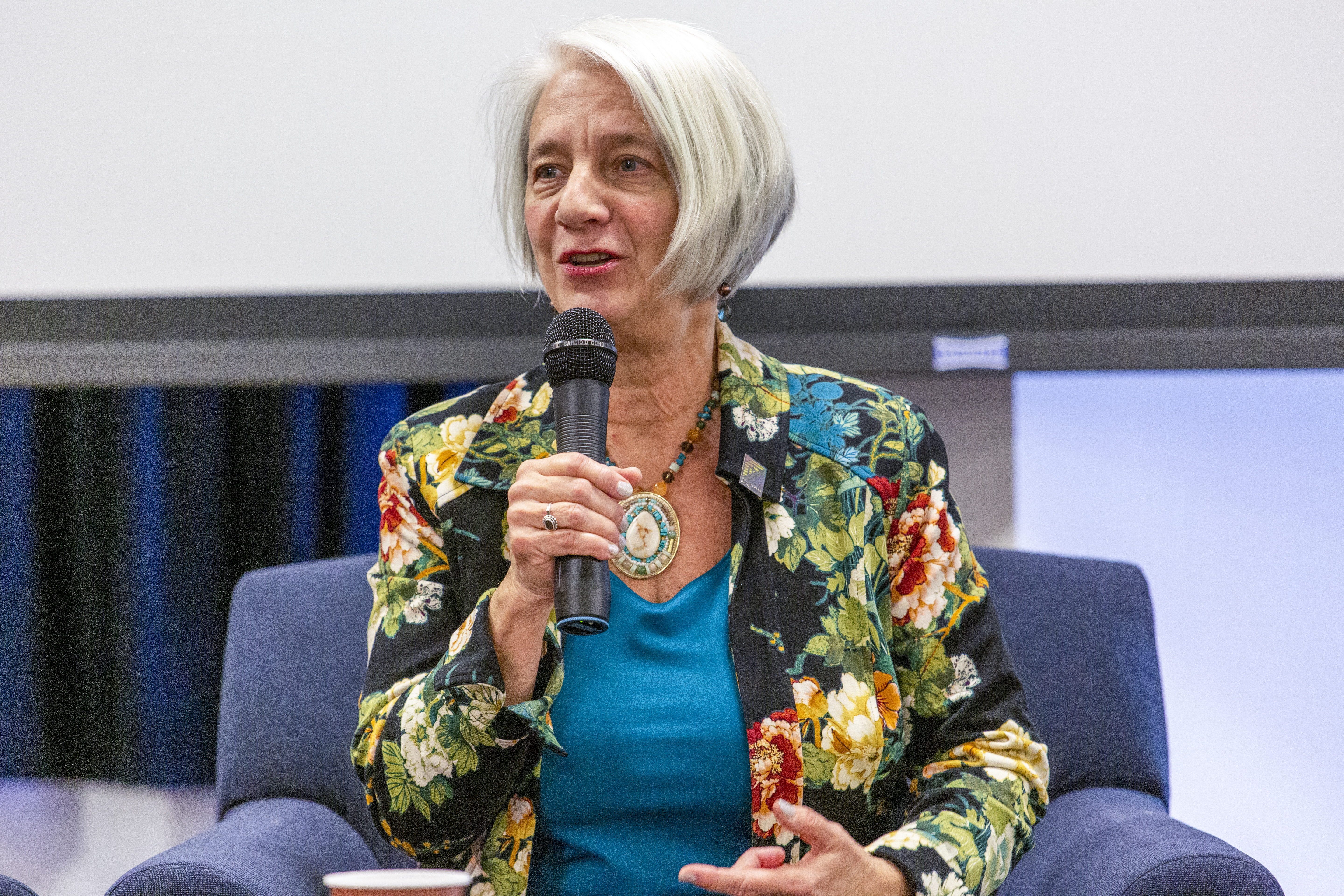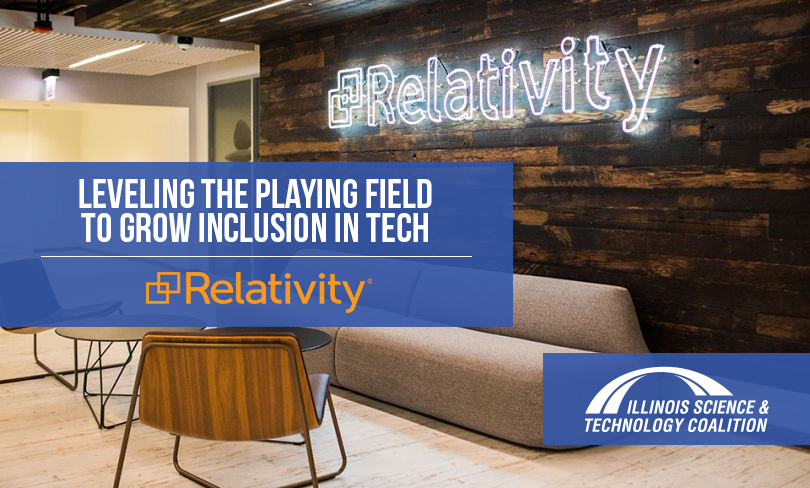Q&A WITh Dorie blesoff
Chief People Officer, Relativity
Subscribe to get the Catalyst newsletter sent to your inbox.
Relativity (formerly kCura) is a real Chicago startup success story. For those that are not familiar, tell us about the company and how it’s been able to scale in Chicago.
Relativity is certainly scaling in Chicago from an employer perspective, but also globally with our business. As a global legal technology company headquartered in Chicago that helps the e-discovery community more easily organize data and implement findings into daily work, our transition to a SaaS-based company has allowed us to grow our customer base and has also required the expansion of our team. We are market-leading in the legal industry and are starting to explore new areas of business with products such as Relativity Trace, which focuses on regulatory compliance monitoring. Through scaling up, we’ve been hiring across a variety of positions and skillsets, all while paying attention to our core values and which candidates will be additive to our culture as we evolve.

Dorie Blesoff at the Illinois Innovation Index State of STEM Talent Panel Discussion. Dec. 5, 2019.
First as a consultant, and then as Chief People Officer, you’ve been instrumental in developing Relativity’s employee recruitment and development initiatives, while also fostering a strong work culture. What principles have you employed to guide this work?
One principle that I strongly believe in is viewing investment in talent development as a key business imperative. Today’s workforce looks for companies that will enable them to achieve their personal and professional goals as well as grow through numerous learning opportunities. Since the very beginning of my work with Relativity, and the reason I chose to accept the role of Chief People Officer 6 years ago, the leadership demonstrated a clear and persistent commitment to invest heavily in employee growth and development. You can’t grow your organization unless you grow your people. With our current CEO, Mike Gamson, we are continuing along this track as we evolve as a “talent-first” organization. Additionally, having a growth mindset as both an employee and an employer is critical to career development. The job and recruitment landscapes are constantly progressing, as are the candidates themselves. In a rapid growth environment, there is a consistently changing list of priorities and things to tackle that we may not have developed the muscle for yet. Growth mindset reminds us that we just don’t know how to do something, yet, but if we work hard and keep at it, the next right thing will become clear. Our talent continues to improve and grow smarter along with our company, so we must ensure that we are offering the proper tools and opportunities to help them extend that growth.
When it comes to recruiting tech talent in Chicago, as compared to other national tech hubs, what challenges have you faced? What advantages does recruiting to Chicago present?
We love working and recruiting in Chicago, which strives to be an inclusive, diverse and welcoming city, and Relativity strives to act in the same manner when recruiting candidates. As Chicago is a growing tech hub – the largest in the Midwest – that offers exciting opportunities, there is a plethora of start-ups that are growing in tech incubators through organizations like 1871 that find success and stay here long-term. We truly enjoy partnering with such organizations and companies to help our city flourish and grow its tech chops. While we don’t necessarily view recruiting tech talent in Chicago as a challenge, we are in “co-opetition” for similar talent with other great companies in Chicago – we need to ensure we offer the best work experience, rewards, and growth opportunities to our employees. However, we are facing the challenge of brand awareness outside of the legal industry and our home city. We also have the advantage of having a CEO who is committed to growing Chicago as a global tech hub and cares deeply about being known to all potential recruits as a great place to work.
As our 2019 Talent Index highlighted, diversity and inclusion in the tech talent pipeline are lacking. The Index calls for employers to step up and do more to address the issue. Relativity is doing just that. Can you tell us about the company’s efforts to include more Illinoisans in the tech pipeline? (Fellows program and any other initiatives)
For more than 10 years, Relativity has invested in “leveling the playing field” by providing milestone-contingent 3-year grants to local schools and smaller grants to many neighborhood and non-profit organizations that allow them to invest in technology. Our offices around the world find ways to partner with those who are enriching opportunities for students, graduates and early career individuals to become successful in the tech field. In 2020, Relativity will launch Relativity Fellows, a program that will bring legaltech training and education to our local neighborhood communities to jumpstart technology careers. The goal is to pay and train these participants on how to use our platform and then place them into open roles either at Relativity or at our customers and partners. As our CEO Mike Gamson says, “Talent is often distributed evenly, while opportunity is not.” Through the Relativity Fellows program, we will look to provide those opportunities to the bright and talented individuals who are hungry to learn and be successful in the technology field and provide a model that other companies can utilize as well.
Employers often seem unsure about their role in improving diversity in the workforce, sometimes deferring to education institutions to take on the issue. In your view, what role should employers play in this effort?
First of all, it’s critical for employers to understand that in order to succeed with an engaged workforce, they need to care first about being a welcoming and inclusive environment that attracts people with different professional expertise, life experiences, identities, passions, strengths, etc. Research shows that diverse teams win, but due to inherited social dynamics and implicit and unconscious biases that are deeply engrained in our thinking and our practices, not all organizations build out truly diverse teams. If employers don’t address this, they will not benefit from the advantages of inviting and retaining exceptional talent from all sources. Intention, education, and investment are needed on an ongoing basis in order to shift the norms that have led to exclusion and lack of diversity in the past. Employers need to contribute both to diversifying the pipeline (branding, sourcing, outreach, networking) and building diversified candidate pools (ensuring that the very best talent is available).
Subscribe
Subscribe to get the Catalyst newsletter sent to your inbox.
What we’re reading
- 8 Things to Know from the FY 2020 budget [SSTI]
- U. of I. President Tim Killeen Talks Tuition Hikes, Enrollment [WTTW]
- Chicago Sees Strong Year in VC Funding with $2.2B Raised in 2019 [Chicago Inno]
- Where the (good jobs) are [Crain’s]
- Illinois Building Strengths Across Industries [Expansion Solutions Magazines]

